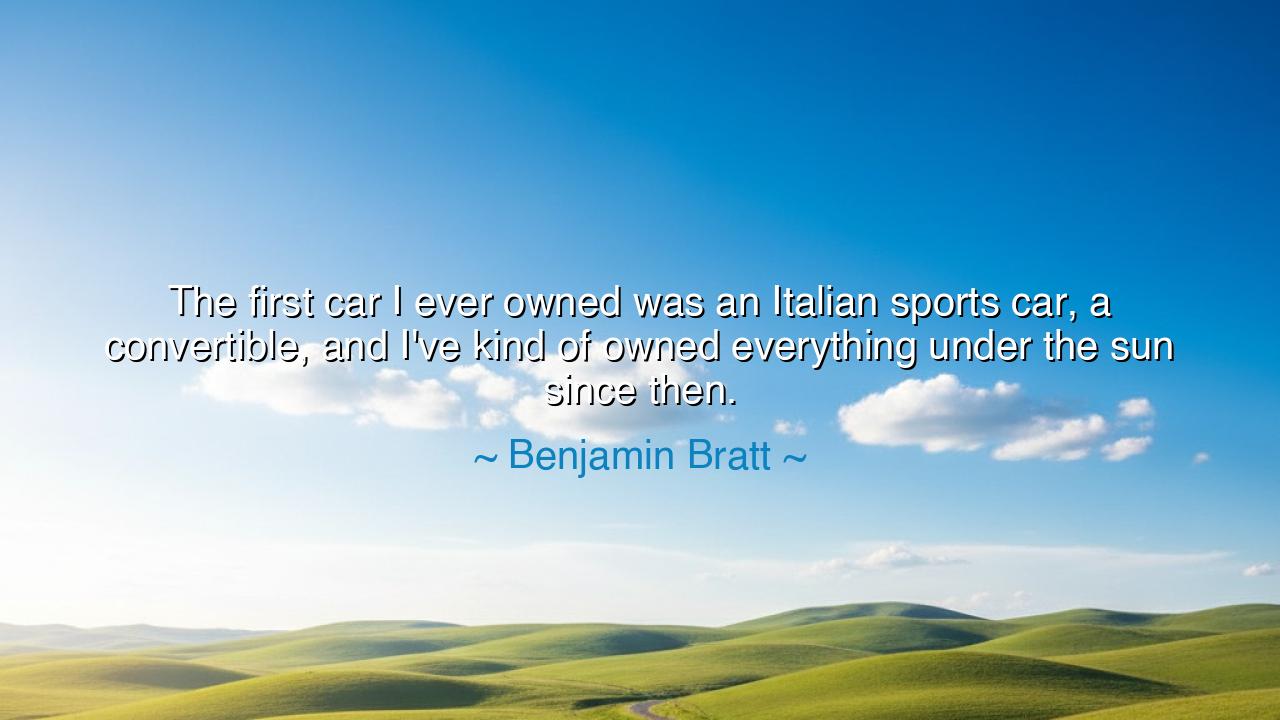
The first car I ever owned was an Italian sports car, a
The first car I ever owned was an Italian sports car, a convertible, and I've kind of owned everything under the sun since then.






The words of Benjamin Bratt shimmer with memory and revelation: “The first car I ever owned was an Italian sports car, a convertible, and I've kind of owned everything under the sun since then.” At first they may appear to be a casual recollection of possessions, but beneath them lies a lesson in desire, fulfillment, and the endless search for meaning. For to begin one’s journey with splendor is to learn quickly that material riches, however dazzling, cannot alone satisfy the hunger of the human spirit.
The Italian sports car, with its elegance and speed, symbolizes not only luxury but the intoxicating promise of freedom. To sit behind its wheel is to taste the thrill of motion, to feel the road as a stage for adventure. Yet Bratt’s words point beyond the vehicle itself, toward the truth that even the most exquisite possession soon becomes just one among many. After the first thrill fades, the heart seeks more, and so he says he has owned everything under the sun — a phrase echoing the wisdom of the ancients, who declared that nothing in the world of possessions can ever fully satisfy.
This sentiment recalls the words of King Solomon in the book of Ecclesiastes, who, after tasting every pleasure and gathering every treasure, declared, “All is vanity and a chasing after the wind.” Solomon had wealth, power, wisdom, and beauty surrounding him, yet still he felt the emptiness of acquisition without purpose. Bratt’s reflection, though lighter in tone, carries a similar undertone: that the thrill of ownership is fleeting, and that no matter how fine the car or how grand the possession, the heart will always look for something deeper.
Consider also the tale of Alexander the Great. He conquered vast lands, from Greece to India, and indeed he “owned everything under the sun” in his own way. Yet when he reached the end of his conquests, he wept, saying there were no more worlds to conquer. His story stands as a mighty echo of the truth Bratt implies: that the pursuit of possessions and power, however glorious, leaves the soul still restless, longing for a victory not found in conquest but in contentment.
The origin of Bratt’s words lies not merely in his love of cars, but in the broader human experience. To acquire is natural, to desire is human, but to recognize the limits of possession is wisdom. By beginning with extravagance — an Italian convertible — he unknowingly walked the path many dream of, only to discover that the heart’s thirst cannot be quenched by ownership alone. His statement is not one of regret, but of recognition: that in the endless chase of possessions, the soul must pause and ask, “What am I truly seeking?”
The lesson is clear: possessions are meant to serve, not to define. Let us enjoy beauty without being enslaved by it. Let us ride in fast cars, dwell in fine houses, and take joy in the works of our hands, but let us never forget that their shine fades. What endures are the journeys we take, the love we share, and the wisdom we gather. To “own everything under the sun” is worthless if we do not also own peace within.
So, children of tomorrow, remember this teaching: do not measure your life by the things you collect, but by the spirit you cultivate. Seek experiences that shape you, friendships that strengthen you, and purposes that guide you. Let possessions be tools of joy, not idols of longing. For the man who has everything under the sun but lacks meaning walks in shadow, while the man with little, yet with love and purpose, stands in the true light of freedom. And in this light, every car, every treasure, every sunrise becomes not a conquest, but a gift.






AAdministratorAdministrator
Welcome, honored guests. Please leave a comment, we will respond soon